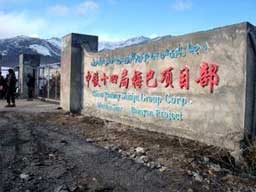Until the summit of June 2012, Afghanistan didn’t enjoyed the status of observer but was part of the SCO-Afghanistan Contact Group. In this summit, SCO put its relations with Kabul on the fast track by granting Afghanistan observer status. It joins India, Iran, Pakistan, Mongolia and Turkmenistan in this category.
Religious extremism, terrorism, and drug trafficking in Afghanistan have continued to pose threats to the region, giving SCO member nations a vested interest in the country’s stability. While Central Asian involvement in the NATO-led peacekeeping mission has been limited, Afghan President Hamid Karzai has backed greater SCO participation in rebuilding efforts. Some SCO member nations are actively engaged in Afghanistan. China has become the largest investor in Afghanistan; a $3 billion contract to develop the Aynak copper mine (مس آینک), which the state-owned China Metallurgical Group won in 2007, is one of the largest foreign investments in the country to date. Kazakhstan has made significant investments there as well.
Despite these developments, a heightened SCO role in Afghanistan may be unlikely, in large part due to Russia’s obstructionism, according to some experts. Russia’s aversion to a U.S. military presence in Central Asia is generally believed to have influenced the 2009 decision by Kyrgyz President Kurmanbek Bakiyev to close the U.S. base in Manas, which was allegedly quid pro quo for Russian financial assistance. Russia is trying to gain a “source of leverage" by closing this major supply point into Afghanistan and making itself more essential to the success of the Afghan conflict.
Nevertheless, some experts believe that several Central Asian states are eager to assist in Afghan reconstruction efforts. To facilitate their participation, the United States should engage directly with these countries, in parallel through the SCO or Russia. Furthermore, hiring Central Asian workers for reconstruction efforts in Afghanistan would be far cheaper than America’s current use of Turkish, European, and North American firms.

